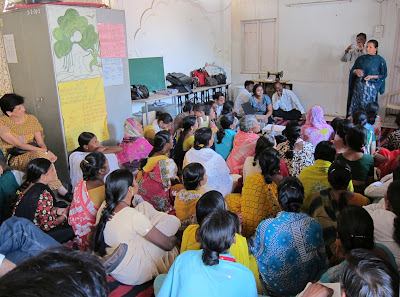On 26th & 27th September 2011 the Executive Director of Shelter Associates gave a presentation at the 24th World Congress of Architecture in Tokyo. The subject of the session intended to be on the growth of cities generally but was re-titled, by the organisers of the event after the earthquake in Japan on 11th March 2011, to “How to regenerate hope of living after a disaster”.
The presentation first established a common problem associated with both natural disasters and neglectful planning:
“There many people who live in locations without adequate infrastructure for safe, healthy, dignified and comfortable living that have not experienced extreme weather or earthquakes; they are victims of a different agent of change; the economy. Prosperity and employment opportunities are not democratically distributed; they are focused in particular geographical locations. This situation leads to an exodus of people from poorer areas and an influx of people into areas with greater economic activity. As the public sector and the private sector has failed to increase their housing stock to match the growth of their population, citizens have no choice but to establish themselves in unofficial communities commonly known as ‘slums’. This type of disaster is a social disaster not a natural disaster but the result is similar; there is a discrepancy between what is needed and what is available, in terms of housing and basic services.”
The Executive Director then suggested that Shelter Associates approach to slum rehabilitation should be adopted when designing new housing for people who have been cast into poverty by natural disasters:
“While Shelter Associates has no experience in working on aid projects in relation to international humanitarian missions, we have 18 years experience of working with the urban poor in Maharashtra and believe that the principle which guides our approach could serve as an important principle that could guide relief projects. It is important to understand the situation which you are addressing; it is of vital importance to understand the culture and needs of the people who you are trying to help (as well as having their input and support). Data must be collected, organized geographically, and analyzed to generate an effective rehabilitation strategy.“
A poorly designed slum rehabilitation housing scheme was presented to highlight the responsibility of city officials and construction professionals:
“Hope exists in vast quantities in even the most bleak of environments, it is not hope which requires our regeneration but the fairness and morally equality of our planning policies. Even though the problem of inadequate housing requires immediate attention and immediate action there is no justification for inadequate thought and insensitive design. As construction professionals will still have a duty-of-care to the people who reside within our designs, even when we are designing in response to emergency situations. We should apply the same professional rigor when designing transition camps, transitional shelters and new housing for the poor as we do when we are designing commercial centers, hospitals, offices and airports.“
The Executive Director then concluded:
“2000 years ago the Romans believed that you should judge a civilization by what it does with its waste; perhaps today in the 21st Century, in addition to waste management, we should be judging our civilization on how we treat our fellow citizens who live in poverty, including those people who are cast into impoverished conditions due to extreme environmental events and/or extreme neglect.“






 On 17th January, Shelter Associates gave a presentation in the community of Shivrai Nagar to tell residents more about their work, and celebrate the completion of 105 individual toilets in the settlement.
On 17th January, Shelter Associates gave a presentation in the community of Shivrai Nagar to tell residents more about their work, and celebrate the completion of 105 individual toilets in the settlement.

